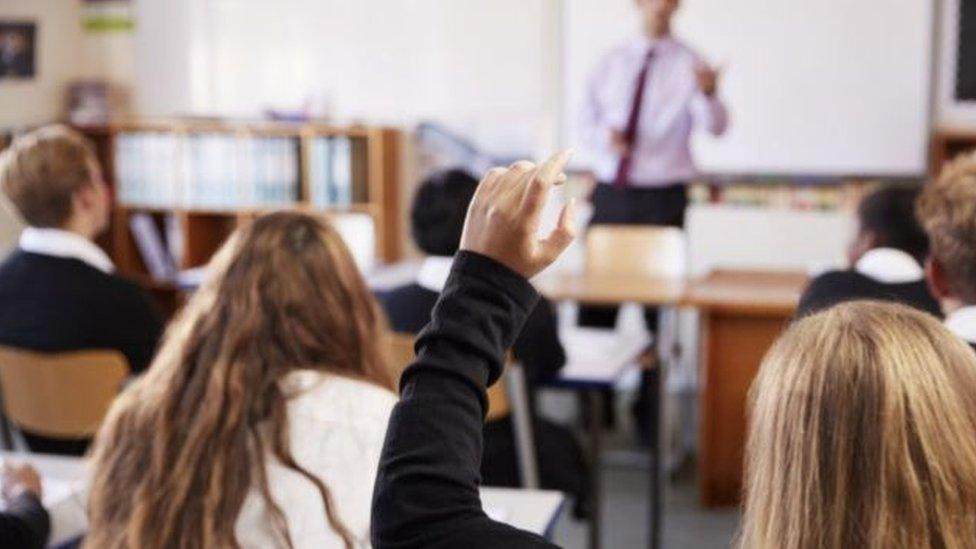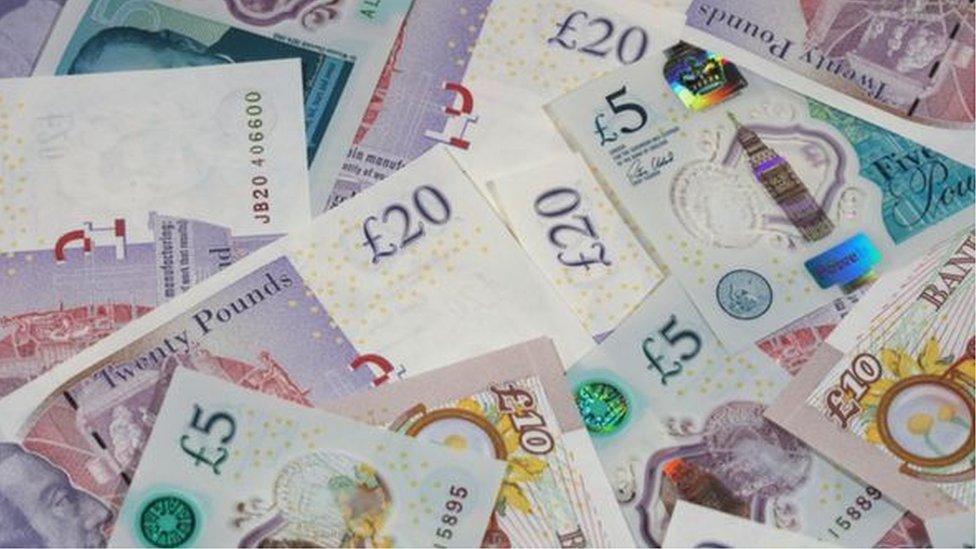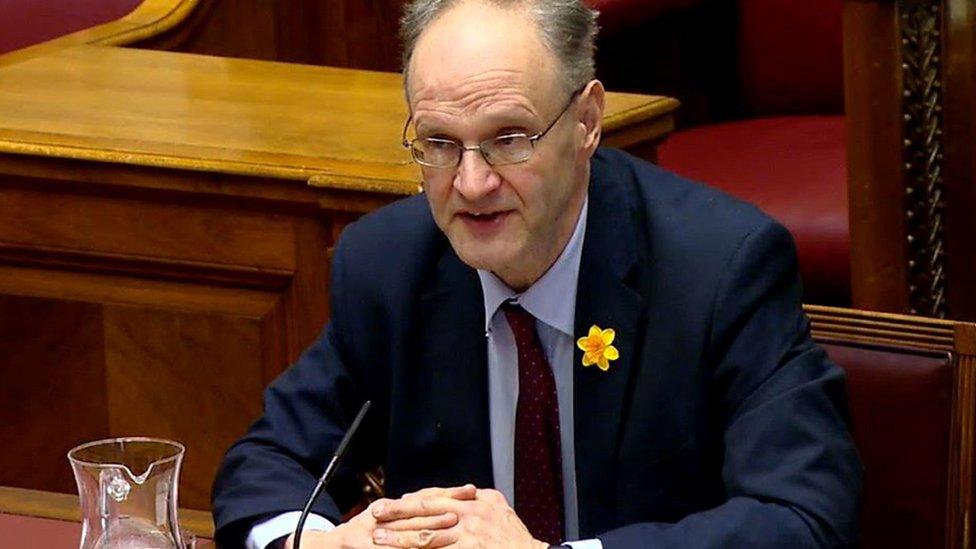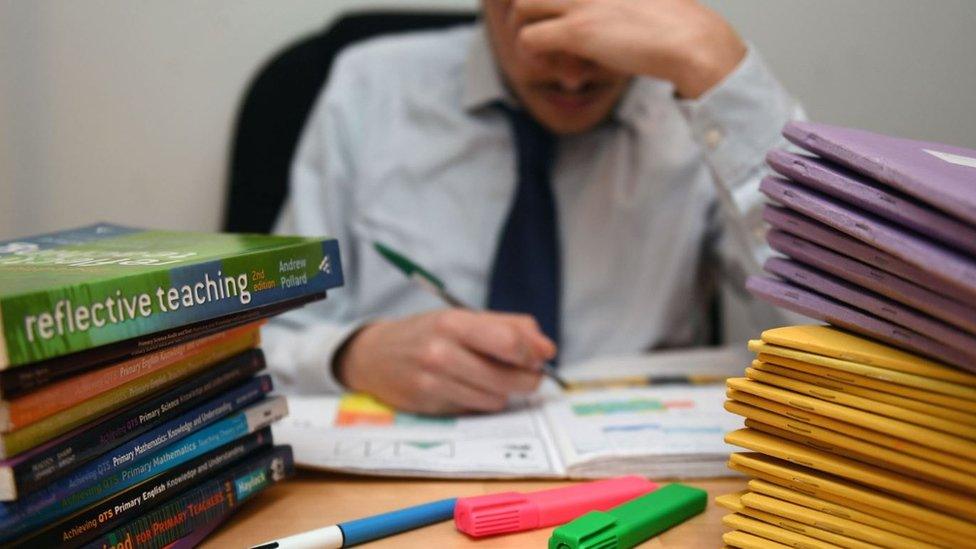Teachers' pay dispute: Thousands offered to break deadlock
- Published

The cost of a pay rise to cover the years 2017 to 2019 has been put at around £70m.
Teachers will each get thousands of pounds of backdated pay if they accept a deal from the Department of Education.
The department has made an offer to unions to settle the long-running teachers’ pay and workload dispute.
Teachers will get a lump sum of money backdated to September 2017 if they accept the deal.
The cost of the 4.25% pay rise to cover the years 2017 to 2019 has been put at about £70m.
A number of other reforms to workload and school inspections are part of the offer.
Education received an additional £226m in the 2020-21 budget compared to its starting position in 2019.
However, the department had asked for more money to cover increasing costs and demands.
How much will the payments be?
Under the terms of the deal, teachers will get a backdated pay award of 2.25% for 2017-18 and 2% in 2018-19.
For a teacher currently earning £37,870, for example, that would mean a pay rise to £39,498 plus back pay to 1 September 2017 of about £3,700 which would be paid as a lump sum by this summer.
All five of the teaching unions will have to accept the deal but some have already recommended it to their members.
Justin McCamphill from the NASUWT said the offer was long overdue.
In a letter to its members, the NAHT said it would "strongly recommend" the deal and said it would carry out a ballot on it from 15 -22 April.

Teachers will receive cash payments in the thousands by the Summer
The INTO, NEU and UTU have also said that if their members accept the deal they will end their ongoing industrial action.
Negotiations could also then begin on a pay settlement for 2019-20 and 2020-21.
Free school meals
Meanwhile, hundreds of children in Northern Ireland have not been able to get free school meals payments because their families do not have a bank account.
The children affected include those from Roma and traveller families, as well as asylum seekers.
About 97,000 children in Northern Ireland are eligible for free school meals and the vast majority have been catered for.
As schools are closed due to the coronavirus pandemic their families are being paid £2.70 a day per child in a scheme run by the Department of Communities and Department of Education.
'A small number of children'
Responding to a question from the Sinn Fein MLA Karen Mullan at a sitting of Stormont's Education Committee, the permanent secretary at Department of Education, Derek Baker, said it was hoped those children could be provided with food parcels.
"There is a small number of children, it could be measured in the hundreds, in the categories of asylum seekers and perhaps Roma and travellers who we haven't been able to contact or get bank account details for," Mr Baker said.
"We're engaged with the Department for Communities in the context of Minister Hargey's efforts to get food parcels so that we can identify those children, identify their addresses and get food to them."
A scheme to pay substitute teachers who are losing work due to schools being closed has also been drawn up by Department of Education.
Education Minister Peter Weir said substitute teachers would continue to be paid if they were already working on a contract in school, but others who are not working on a contract may also be paid.
He said, however, that the Department of Finance and the Executive would have to approve and provide the money for the scheme.
He said that how much substitute teachers would be paid until the end of term would be based on what work they had done from January to March 2020.

Education Minister Peter Weir said substitute teachers would continue to be paid
"Peoples entitlement would be based upon that," he told the committee.
"We'd be looking at proposals that would be in and around the 80% type situation.
"It requires direct finance beyond simply the education budget.
"We don't have a budget line that would be able to supply that."
Mr Weir was also questioned whether special schools should have access to more personal protection equipment by a number of MLAs including the Alliance Party's Chris Lyttle and the SDLP's Daniel McCrossan.
- Published29 April 2019

- Published19 February 2020
